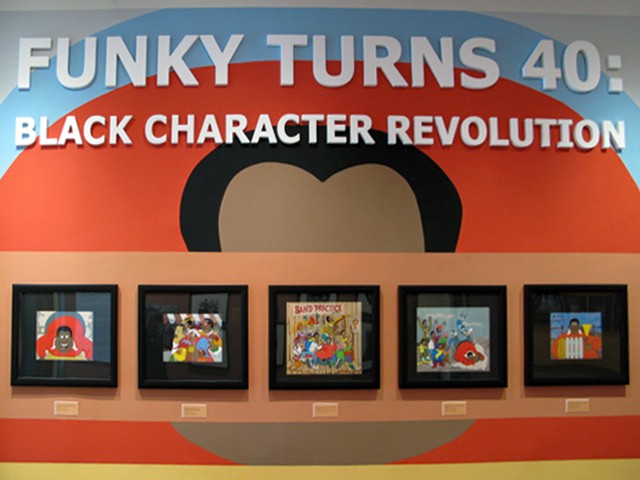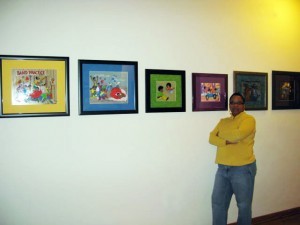Hey Hey Hey! New Animation-Inspired Exhibit, Funky Turns 40: Black Character Revolution to Open at Schomburg Center February 5th.
The exhibit contains over 60 pieces of black animated art from the 1970s from popular shows like Fat Albert and the Cosby Kids, Schoolhouse Rock, and the Harlem Globetrotters
January 13, 2014—The Schomburg Center for Research in Black Culture is pleased to present its latest exhibition, Funky Turns 40: Black Character Revolution, a nostalgic foray into the animated images of the black characters of popular cartoons of the 1970s. The Schomburg Center is located at 515 Malcolm X Boulevard at 135th Street in Harlem, New York; the exhibit will be housed in the Center’s Latimer Gallery, on display from February 5 to June 14, 2014.
Co-curated by cartoon aficionados Pamela Thomas and Loreen Williamson, Funky Turns 40 includes over sixty pieces of animated art from the Museum Of UnCut Funk, an online collection developed by Thomas and commemorates the 40th anniversaries of popular 1970’s Saturday morning cartoons that featured positive Black characters for the first time in television history.
“I believe these cartoons are national treasures,” says Thomas. “They were seen by a generation of children and not only changed the way that Black kids saw themselves but the way White kids saw them as well”.
It was during the late 1960s / early 1970s that Saturday morning television cartoons began to feature Black animated characters in a positive and realistic manner. Fueled by the Civil Rights movement and the over-whelming commercial success of Black musicians and athletes during this time period, television producers began to explore projects with a wide, multicultural appeal.
This new generation of Black characters were stars of their own series with a modern look and with contemporary story lines that delivered culturally relevant messages. Bill Cosby’s Fat Albert and the Cosby Kids paved the way for a host of Black characters and shows featuring music icons, sports heroes, and multicultural casts like The Jackson 5ive, Josie and The Pussy Cats, The Harlem Globetrotters, and I Am The Greatest (featuring Muhammad Ali). Even franchises like the overtly white Hardy Boys series and Super Friends began to introduce positive Black characters who worked side by side with their white counterparts.
For the first time, children saw cartoon characters that looked and talked like real Black people, full of warmth, humor, and intelligence.
These shows empowered a generation of children with cartoon role models who promoted family values, education, friendship, civic duty, personal responsibility and sportsmanship in fun, vibrant bursts of animation. The production of these cartoons also employed Black animators, musicians and actors – jobs that had traditionally been filled by non-blacks who often approximated their understanding of Black culture. It was also during this time that prominent African Americans like Bill Cosby and Berry Gordy led the development of animated television programming featuring Black characters, from concept through to art creation and production.
Practically every piece of art in Funky Turns 40 features many black characters achieving historic firsts in television:
- Peter Jones – The Hardy Boys (1969) – First positive Black male character in a Saturday morning cartoon series
- Valerie Brown – Josie And The Pussy Cats (1970) – First positive Black female character in a Saturday morning cartoon series
- Harlem Globetrotters (1970) – First positive Black cast Saturday morning cartoon series and first positive Black cast Saturday morning cartoon series featuring Black athletes
- The Jackson 5ive (1971) – First positive Black cast Saturday morning cartoon series featuring Black musicians
- Fat Albert and the Cosby Kids (1972-1985) – Longest running positive Black cast Saturday morning cartoon series
- Verb – Schoolhouse Rock (1974) – First Black male superhero character in a cartoon – second Schoolhouse Rock episode to feature Black Characters
- Astrea – Space Sentinels (1977) – First Black female superhero character in a Saturday morning cartoon series
This revolution in how Black animation characters were developed and portrayed represents historic change and the ultimate manifestation of Dr. Martin Luther King Jr.’s dream. Forty years later, the legacy of these revolutionary cartoons has eclipsed the stereotypical images that came before and have paved the way for a new generation of Black animation like The Proud Family, Little Bill, Static Shock, Fillmore and Doc McStuffins!
###
For more information, please contact: Adenike Olanrewaju; 212-592-7008; adenikeolanrewaju@nypl.org
The New York Public Library, Public Relations Office
188 Madison Avenue, 5th Floor, New York, NY 10016 | T : 212.592.7700 | F: 212.592.7729 | www.nypl.org



